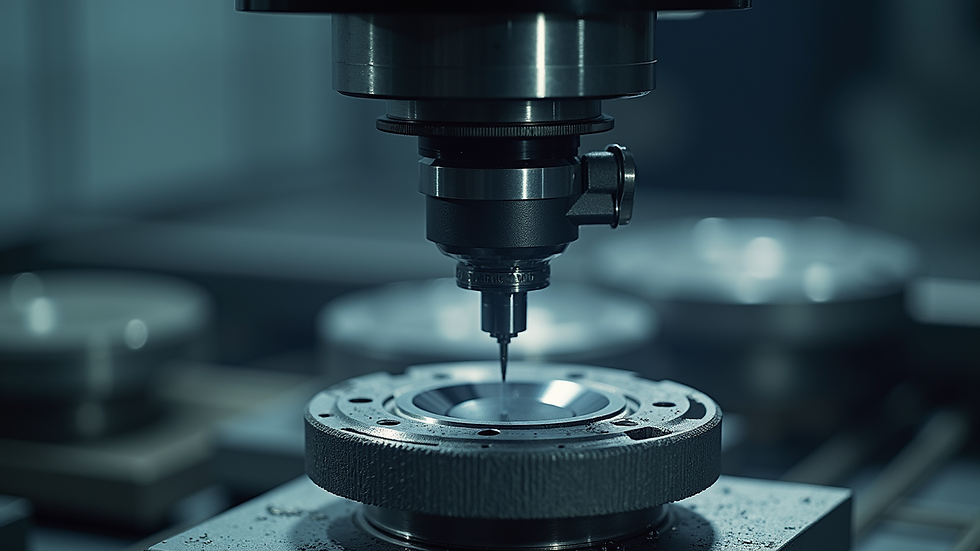The Benefits of Advanced Machining Techniques for High-Quality Production
- sanshiaerotech
- Jun 19, 2025
- 4 min read
In today's fast-paced industrial landscape, advancements in technology have driven manufacturers to seek methods that enhance quality, speed, and efficiency. Among these innovations, advanced machining techniques stand out, offering a game-changing approach to production processes. This blog post delves into the benefits of these approaches, specifically how they contribute to high-quality production.
Understanding Advanced Machining
Advanced machining refers to sophisticated techniques that improve traditional processes and include methods like CNC (Computer Numerical Control) machining, laser cutting, and additive manufacturing. The core objective is to produce parts and products with higher accuracy at a lower cost and faster pace.
For example, while traditional machining often involves manual operations and slower processes, advanced techniques utilize automated systems that enhance precision and reduce human error. This shift can lead to the production of countless components that are uniform in quality and performance.

Advantages of Advanced Machining Techniques
Enhanced Precision and Accuracy
One of the hallmark benefits of advanced machining techniques is the enhancement in precision and accuracy. For industries that demand stringent tolerances, such as aerospace and automotive, even minor deviations can lead to significant failures. Advanced machinery ensures tight controls over dimensions, often achieving tolerances within a few microns.
Take the automotive industry, for example. With advanced CNC machining techniques, manufacturers can produce engine parts that fit seamlessly, thus improving vehicle performance and reliability. The ability to meet such refined standards not only results in better products but also reduces waste and rework costs.
Increased Efficiency and Speed
Efficiency is paramount in manufacturing, and advanced machining techniques significantly enhance production speeds. Automation plays a crucial role, allowing machines to operate continuously without the delays associated with manual processes.
By implementing modern technologies, companies can achieve higher output rates while maintaining quality. For instance, laser cutting can process materials at much faster speeds than traditional blade cutting, resulting in quicker turnaround times for projects. Manufacturers can meet increasing market demands without compromising quality—a true win-win situation.

Cost Reduction.
The implementation of advanced machining techniques also contributes to substantial cost savings. While the initial investment in advanced machinery may appear high, the long-term benefits often outweigh the costs. The reduction in waste, faster production times, and improved quality lead to lower overall production costs.
Moreover, fewer errors in production mean that manufacturers spend less on rework and scrap materials. This efficiency allows businesses to allocate resources more effectively, enhancing profitability. As such, companies adopting advanced techniques often see notable returns on their investments in terms of lower operational costs and increased revenue.
Flexibility in Production
Advanced machining technologies offer remarkable flexibility, allowing manufacturers to adjust quickly to changing market demands. With traditional methods, altering production lines can entail significant downtime, affecting overall productivity. Advanced techniques, on the other hand, can be easily programmed and reconfigured to produce different parts without extensive delays.
For instance, CNC machines can be programmed to switch between different designs with minimal setup time. This flexibility is crucial in an era where consumer preferences are constantly evolving. Manufacturing companies can respond faster to trends and increase their competitive advantage.
Sustainability and Environmental Impact
As industries continue to prioritize sustainability, advanced machining techniques offer a pathway toward more environmentally friendly production. Techniques like additive manufacturing generate less waste compared to traditional subtractive methods. By building parts layer by layer, companies can utilize only the necessary materials, minimizing excess waste and supporting sustainable practices in manufacturing.
Furthermore, many advanced machines are designed to be energy-efficient, reducing the carbon footprint associated with production. As consumers increasingly seek products from environmentally responsible manufacturers, the adoption of advanced machining techniques can play a vital role in enhancing a brand's image and appeal.

Real-world Applications of Advanced Machining Techniques
To grasp the impact of advanced machining techniques, it helps to explore real-world applications. Various industries have embraced these innovations with remarkable results.
Aerospace Industry
In the aerospace sector, precision is critical. Advanced machining allows manufacturers to create lightweight components that meet strict regulatory standards without compromising performance. For instance, titanium components can be machined to precise specifications, allowing aircraft to achieve optimal performance while ensuring safety.
Medical Equipment Manufacturing
In the medical field, advanced machining techniques offer unparalleled precision, which is crucial for creating devices such as surgical instruments and implants. CNC machining enables the production of complex geometries that traditional methods could not easily achieve, improving patient outcomes and enhancing product reliability.
Automotive Sector
The automotive industry has leveraged advanced machining technologies to enhance operational efficiency and product quality. With rapid prototyping capabilities, manufacturers can create and test new designs quickly, shortening the development cycle and bringing innovative vehicles to market faster.
The Future of Advanced Machining
As technology continues to evolve, the future of advanced machining promises even greater advancements. Innovations such as artificial intelligence (AI) and machine learning may lead to autonomous machines that can self-optimize for better performance.
Additionally, as materials science progresses, new materials could emerge, enabling machines to produce components that were previously impossible to create. The integration of these technologies will expand the scope of what is achievable, paving the way for smarter and more efficient production systems.
By combining the benefits of advanced machining—precision, efficiency, cost reduction, flexibility, and sustainability—manufacturers can position themselves favorably in a competitive market.
Embracing the Change
To truly realize the benefits of advanced machining techniques, companies must embrace the necessary changes in their manufacturing processes. This includes investing in the right technology, training employees on new systems, and continuously evaluating production strategies to include the latest innovations.
For businesses looking to enhance their production capabilities, exploring options in precision CNC machining can be an excellent starting point. By adopting advanced techniques and refining operations, manufacturers gain a powerful tool to meet modern challenges head-on and thrive in a rapidly evolving industry landscape.




Comments